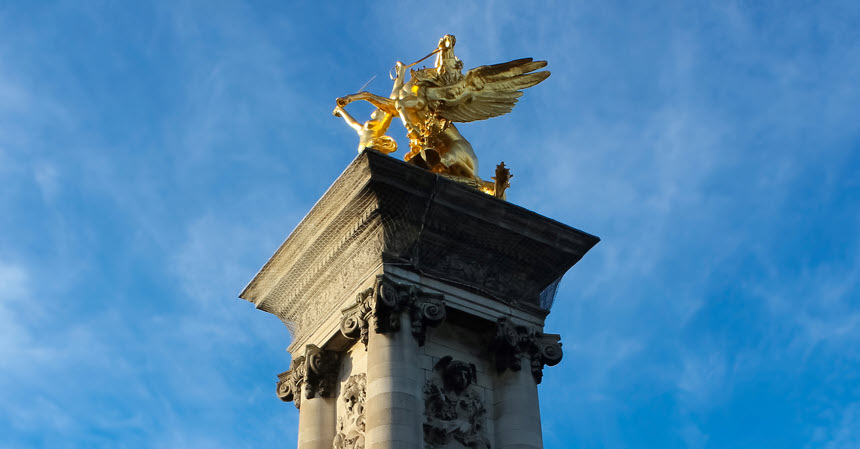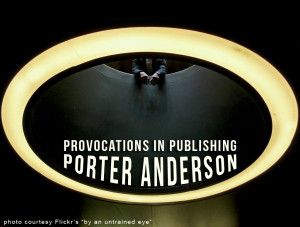Ego, ‘LitFlation,’ and Honor(s)
By Porter Anderson (@Porter_Anderson) | February 18, 2022 |

At the Pont Alexandre III over the Seine in Paris, January 1, 2022. Image – Getty iStockphoto: Marina113
‘I’m Tired of My Ego’
That’s become one of my favorite lines of 2022, a young year that already feels three decades long. “I’m tired of my ego.”
This sentiment was shared by a Christian artist who is referred to, Madonna-like, by a single name, Lecrae. (He might begin by trying to remember a first or last name.) I ran across his confession while researching recent marketplace uses of the term ego. Lecrae, who is a 42-year-old Texan, “spent the weekend posting photos and videos of himself at the SoFi Stadium” during the You Know What Bowl. Friends later “humbled him,” Lecrae graciously conceded, according to Jeannie Ortega Law at the Christian Post.
I’d been set thinking about the place and purpose and potentials of ego by our columnist at Publishing Perspectives, Richard Charkin. Just in time for the onset of the first hand-over-fist awards-news season of this year, Charkin handed me a column we headlined Richard Charkin on ‘LitFlation’: Prizes, Awards, and Egos.
Charkin, the former chief of London’s Bloomsbury Publishing (of JK Rowling fame), writes about book and publishing awards in that piece, “The only impact seems to be to inflate — more inflation — the egos of recipients. When will this inflation ever end? When will publishers’ egos be large enough? When will we spend as much time and effort supporting our authors, particularly when they’re under attack, as we spend on parading against our peers and competitors?”
While Charkin, a publisher, generously points to publishers’ egos as being a driver in the jungle of these many honors, we in the news media also see a certain amount of primo ego in the administrations of some of the awards, themselves, because we’re the ones who hear from their PR agents. I always hope they’ll include a bottle Chanel’s Égoïste with a press release.
To give you a look at the proliferation of these awards on the international scene, in the 35 publication days since January 3, we’ve published 34 awards stories, just shy of one per day. These are jury lists, longlists, shortlists, winners’ lists, and a few stories about awards issues, as in the European Writers’ Council’s decision to withdraw as an administrative body in the European Union Prize for Literature. There are, as I write this, 12 more awards stories in our editorial calendar’s queue, all vying for publication. New ones arrive daily. Some simply won’t make it. We’re not Awards Perspectives. The news cycle is very high.
One insight into the field is found in such self-flattery as “the best-loved award” of a given genre. There’s an awards program that actually graces itself with that unknowable attribute in its press releases. Is that a clue to who the prize’s administrators are thinking about? Is it the authors and publishers they commend?
Much of this has to do with the necessary oxygen of visibility, of course, and that means news coverage. If an award is juried, longlisted, shortlisted, and conferred, and nobody reads about it in the press, has a tree fallen in the forest?
The awards programmers’ original intentions, of course, are great. That shiny sticker on a book jacket may give your cover designer fits but it might also catch the monied eye of a consumer in the bookstore and cinch a sale. And yet, if you ask most consumers which book award’s name they actually know and follow, and they tell you the Oscars, you’re probably closer to the truth of fallen trees than we like to talk about.
The fog of awards. On little PR feet.
The prizes blur together in the lamplight of London. The key criterion of this award or that prize grows faint. So may the readers.
A Salable Energy

Provocations graphic by Liam Walsh
If awards programs tell us anything – other than that there are so many good books by so many good people getting so many accolades that the prize-fighters may have undone their own punch – they probably demonstrate what a pertinent and reliable energy ego carries. And yet it likely is not a driver we explore in characterization as often as might be useful.
I’m betting that’s because by the time you reach the second definition of the term ego, you’re into “self-esteem” in most dictionaries. And we all know that self-esteem (despite so many years of assertive assertion training) can carry bad optics. It’s a third rail. Touch it if you dare. Just ask Lecrae.
But it’s not always unhealthy. The fine author who does think of Bookers and Costas and National Book Awards and Nobels – and not just “in your wildest dreams” – may be getting out of bed and over to the desk each day with the help of some ego. And when you look below the social insecurity of someone who wears her ego on her sleeve, there may be a source of truly resilient drive and purpose there. Not for nothing Chanel.
Announcing it as the unseemly trait many feel it to be will only be appropriate for very specific character conditions.
But it can be embedded.
Like so many other things on a shortlist.
So I’m curious. While we’re surrounded by ego and watch it play out daily in military maneuvers, performative politics, business, Olympic sports dramas and dueling public-health officials, how often do you specifically understand ego to be a driver in your characters’ inner lives?









Ego can push a character to do unthinkable things, some good, some truly heinous. But in fiction, for the most part, there’s a learning curve.. Both kinds of ego drive my 16yo MC in her decision-making. Sometimes she learns from these, other times, not so much. And while the outer goal might be the boy, the revenge, or the Queen Bee crown, there is always an accumulation of wisdom. The fun is in seeing whether she’ll avail herself of it or not. In the end, I think the shifting levels of a character’s egocentricity is what makes stories fun.
I write children’s stories and children, by nature, are completely ego-driven. Babies think the world revolves around them (it does)! They are so helpless, yet they command everybody around them. Toddlers want everything NOW. I do too, lol. Sometimes I think we’ve been put on this planet to learn patience. And older children want to keep growing older. They’re always looking forward wanting to do the things their older siblings do, their parents, etc. Their wants and needs and deep desires drive them powerfully. I love writing for kids. Perhaps I never grew up :)
I just came across this lovely quote by Alice McDermott in What About the Baby? “We writers are all–let’s face it–lonely souls with mountainous egos as delicate as white cliffs of baby powder…”
I love that quote from McDermott, Vijaya. I’ve decided one of the reasons I write is that it lets me “perform” without being seen. A safe place for fragile egos in a business where artists are on the unhappy end of a 95 percent rejection rate.
From the trenches: maybe it gets to be something you’re blasé about after a while, but the first significant award, ‘proof’ that what you’re writing is worthwhile, has a lot of impact.
Monetizing it – in the sense of having readers try your work instead of someone else’s when looking for their next book – is worth the cost and ego-deflating process of submitting to an award and NOT winning it. Why else do the book descriptions for books that are already selling well always start by listing the fabulous prizes the book has been awarded? For many readers, it means they should at least consider purchasing the book. Authors are listed as award winners in their bios from then on, even on guest posts in lowly blogs.
You have to start somewhere. And hope to ratchet your work up in the amorphous world that is advertising and marketing. Unless you already have a lucrative contract for the next ten books.
Oh, Porter, how I love your posts! Always slicing and dicing literature ((which, as you point out, is becoming synonymous with commerce) from a different plane.
This issue of ego is one I have personally worked with/on for decades in order to write. First as a songwriter and performer in the music industry, which in the terms you outline above outshines (outshouts?) the publishing one.
In general, the transmutation of art from a vehicle that is to awaken, please and inspire to one of fame and fortune for the artists and the artist’s handlers is one of society’s great perversions. Michelangelo’s David needs no promo of the artist or the duke who funded him to stop the heart.
Auspiciously, I penned today’s WU post, which hints at how to cut a different path in this ego-driven world. I hope you will peek at it. The stress of awards and fame as the entrance level recognition for an artist to feel she has arrived is detrimental to all our work.